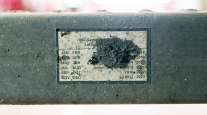Senior Reporter
Out-of-Service Rates Inch Up in CVSA’s Brake Week Blitz

This story appears in the Nov. 21 print edition of Transport Topics.
Commercial motor vehicle officers reported that 13.2% of trucks and buses examined were placed out of service for brake violations during a weeklong law-enforcement operation, compared with OOS rates of 12.3% last year and 16.2% in 2014.
The U.S. and Canadian inspectors also placed 14.8% of commercial vehicles checked out of service with nonbrake violations, according to results released Nov. 14 by the Commercial Vehicle Safety Alliance.
The inspection campaign was the annual Brake Safety Week, Sept. 11-17, when local, state, provincial, territorial and federal personnel conducted 18,385 inspections to identify out-of-adjustment brakes and brake-system violations. CVSA represents North American commercial vehicle inspectors.
Brake Safety Week is part of the Operation Airbrake Program sponsored by CVSA in partnership with the Federal Motor Carrier Safety Administration and the Canadian Council of Motor Transport Administrators.
The roadside checks included brake-system components and whether parts were loose or missing; air or hydraulic fluid leaks; and cracked, damaged or worn linings, pads, drums or rotors.
Inspectors also checked anti-lock braking systems for malfunction- indicator lamps as part of an effort begun during CVSA’s unannounced Brake Check Day in May. Participating jurisdictions reported the number of trucks and buses with anti-lock braking systems as well as ABS violations observed.
The ABS survey for this year’s Brake Safety Week found that:
• 93.2% of air-braked trucks inspected, including tractors, and 90.4% of hydraulic-braked trucks inspected required ABS, based on their date of manufacture.
• 89.4% of air-braked trailers inspected required ABS, based on their date of manufacture.
• 8.8% of ABS-required, air-braked trucks and 8.8% of ABS- required, hydraulic-braked trucks were found with ABS violations.
• 15.8% of trailers requiring ABS were found with system violations.
• 7.6% of trailers inspected were not air- or hydraulic-braked and, therefore, not subject to ABS requirements.
“Brakes must be routinely checked and properly maintained to ensure the safety of the commercial motor vehicle, the CMV driver and everyone else on the road,” said CVSA President Julius Debuschewitz of Canada’s Yukon Highways and Public Works.
“Although brake inspections are a part of the Level 1 inspections conducted by our hardworking CMV inspectors every day, Brake Safety Week is an opportunity to remind motor carriers and drivers of the importance of brake health and safety, and it provides the opportunity for our inspectors to conduct targeted and focused inspections to identify and remove commercial motor vehicles that have brakes with critical violations from our roadways.”
FMCSA considers brakes part of its Compliance, Safety, Accountability program. CSA scores motor carriers and drivers on seven Behavioral Analysis and Safety Improvement Categories, or BASICs, and brakes are included in the maintenance group.




